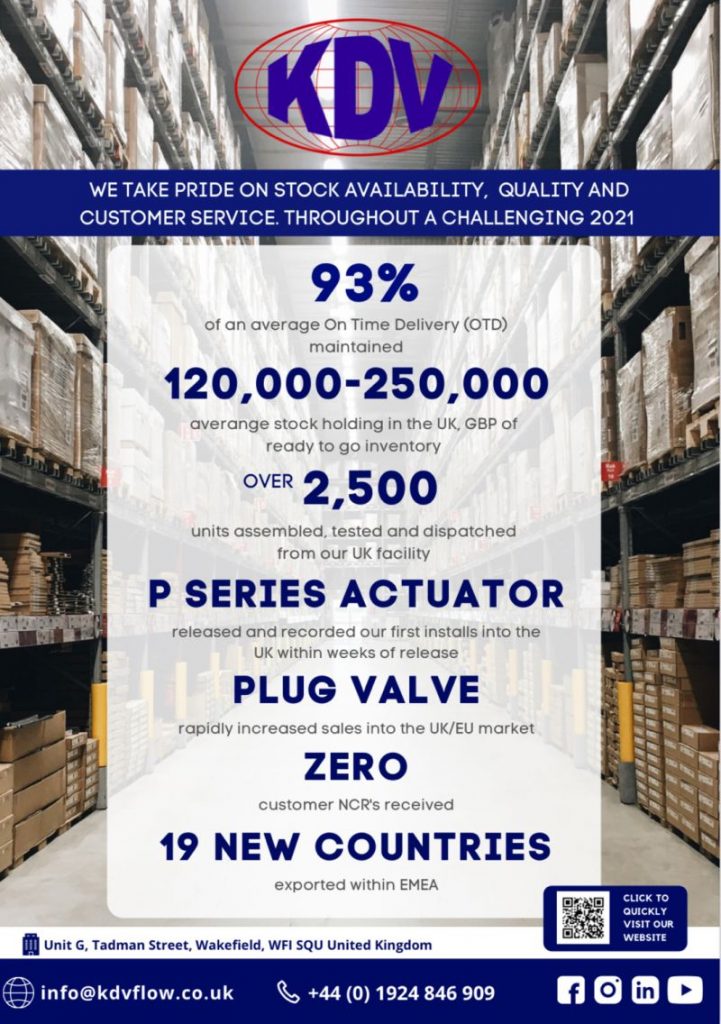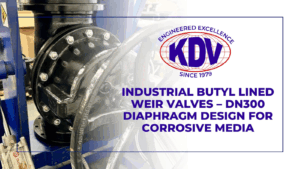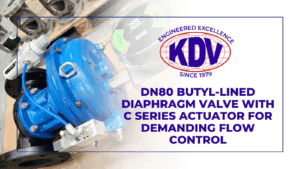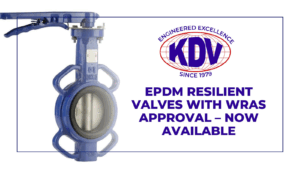What is a weir type diaphragm valve?
A Weir type diaphragm valve is a simple device that is used in many processing and manufacturing industries. The Weir type diaphragm valve gets its name from the weir orifice plate that is used to create the differential pressure across the membrane. One of the key advantages of the weir type diaphragm valve is its ability to operate in both on/off and throttling modes, offering flexibility for process control. Its hermetically sealed design ensures that the diaphragm acts as a barrier between the process media and the external environment, making it suitable for hazardous, corrosive, or sterile conditions. Moreover, the absence of cavities in the valve body reduces the risk of fluid stagnation, making cleaning and sterilization easier, particularly in industries that require strict hygiene standards, such as pharmaceuticals and food production.
With KDV’s multiple options for lined valves, the weir types are benefiting from a resurgence in popularity as more and more engineers and end users have been reminded of the benefits of the diaphragm valve capabilities. Our recent stock takes highlights these valves are not being kept too long on stocks as we receive a volume of quotes for it.

These valves can be used for a wide range of applications such as:
- General purpose on/off, control and even relief functions
Industry Example: Chemical Manufacturing
Companies like BASF or Dow Chemical use weir-type diaphragm valves in general-purpose process control for regulating and isolating chemical flows in production lines. Their reliability ensures safety during the handling of hazardous substances and enables precise adjustments to maintain process efficiency.
- Corrosive, abrasive or inert liquids and gases
Industry Example: Mining and Mineral Processing
Mining operations, such as those conducted by Rio Tinto, utilize these valves in slurry pipelines and acid leaching systems. The valve’s corrosion resistance and cavity-free design are ideal for handling sulfuric acid, caustic solutions, and abrasive slurries in mineral extraction and refining processes.
- High purity liquids and gases
Industry Example: Pharmaceutical Manufacturing
Companies like Pfizer or Novartis rely on weir-type diaphragm valves in the production of sterile pharmaceuticals. These valves ensure contamination-free handling of high-purity water (e.g., WFI – Water for Injection) and sensitive chemical intermediates required for tablet and injectable production.
- Slurries or particle-laden fluids
Industry Example: Food and Beverage Production
In food processing plants, such as those operated by Nestlé or Coca-Cola, weir-type diaphragm valves are used to control the flow of particle-laden fluids like sauces, syrups, or beverages containing pulp. Their design minimizes clogging and ensures hygiene, critical for maintaining food safety standards.
The advantage of the weir diaphragm valve is that it can be used with a wide range of fluids, including those that are corrosive or abrasive. The valve is also able to handle pressures and temperatures others valve types cannot compete with on certain process media, the diaphragm valve can be made from a variety of materials, offer a wide range of lining options and diaphragm grades depending on the application on hand.
Weir type diaphragm valves not only have different materials designed to be used for specific applications, here at KDV we manufacture and stock of a vast array connections too BSPP, NPT and BSPT threaded, Flanged BS Table D/E, ANSI, DIN PN10/16, JIS 5 and 10K connections all availble from stock
A few applications of the Weir Type Diaphragm is used
Water and waste water – Widely used in municipal and industrial wastewater plants, weir type diaphragm valves control flow in processes such as aeration, filtration, and disinfection
Organic sludge – sludge handling systems, particularly in anaerobic digestion plants, these valves are ideal for managing high-solid-content liquids.
Effluent treatment – In chemical and textile industries, effluent treatment plants (ETPs) use weir valves to regulate flow in neutralization tanks and sedimentation basins.
Lime solutions – Lime dosing systems in water treatment plants utilize weir valves to control flow accurately.
Gases (e.g. compressed air) – The hermetic sealing of weir valves makes them suitable for handling compressed air in pneumatic systems, ensuring no leaks and maintaining system efficiency.
Lubricating oil – In mechanical and process industries, these valves are used to manage lubricating oil flows in closed-loop systems.
Certain acids – Chemical manufacturing and refining facilities rely on weir valves for precise control of corrosive acids
Desalination – In reverse osmosis and multi-effect distillation (MED) systems, these valves control brine and chemical flows.
Moist chlorine Chlorinated water (e.g. hydrochloric, sulphuric nitric) – Used in the production of PVC and other chemicals, weir valves manage the flow of moist chlorine without risk of leaks, ensuring worker safety and process integrity.
Demineralised water – Pharmaceutical and electronics manufacturing facilities use these valves to handle ultra-pure water in production processes, where contamination is unacceptable.
Salts Caustic solutions – In industries like soap manufacturing and pulp and paper, weir valves regulate flows of caustic soda and other salt-based solutions with high precision.
Lime Solutions
Copper chemicals – In copper refining, weir valves control the flow of electrolytes and chemicals used in electrolysis processes, where chemical compatibility and reliability are crucial.
Industries that use weir type diaphragm valves are:
Industries that use weir type diaphragm valves are:
Food & Beverage – Weir type diaphragm valves are indispensable in food and beverage production for handling liquid and semi-liquid products such as juices, sauces, and syrups. Their cavity-free design prevents contamination and ensures compliance with strict hygiene standards, such as FDA and 3-A Sanitary Standards. They are widely used in dairy processing for controlling pasteurized milk flow.
Pharmaceuticals – These valves are critical in pharmaceutical production for handling purified water (e.g., Water for Injection) and regulating flow in sterile environments. Their ability to withstand autoclaving and CIP/SIP (Clean-in-Place/Steam-in-Place) processes makes them ideal for ensuring contamination-free production.
Power generation – In power plants, weir valves regulate cooling water, boiler feedwater, and chemical dosing processes. Their compatibility with demineralized water and resistance to thermal cycling makes them suitable for both fossil-fuel and nuclear power generation.
Pulp & paper – The pulp and paper industry relies on these valves to handle abrasive and corrosive substances such as bleach and caustic soda. Their robust construction ensures consistent performance in demanding processes like kraft pulping and chlorine dioxide generation.
Chemicals & petrochemicals – Weir valves manage aggressive chemicals such as sulfuric acid, hydrochloric acid, and caustic solutions used in chemical synthesis, polymerization, and refining. Their chemical resistance and leak-tight design ensure safe handling of hazardous substances.
Semi-conductor – The semiconductor industry depends on weir valves for high-purity applications, including handling ultrapure water and specialty gases like nitrogen and argon. Their contamination-free operation is critical for manufacturing microchips and electronic components.
Oil and gas – These valves play a role in upstream, midstream, and downstream operations, regulating flows of crude oil, natural gas, and processed chemicals. Their resistance to high pressures, abrasive conditions, and corrosive environments makes them essential for critical applications.
Automotive – In automotive manufacturing, weir valves control the flow of lubricants, coolants, and hydraulic fluids in assembly lines. Their precision and reliability support automation and improve production efficiency.
Paint and powder manufacturing – The valves are used to handle pigments, binders, and solvents in paint production. Their cavity-free design prevents clogging and ensures consistent flow, essential for high-quality formulations.
Mining – mining, these valves are used in slurry handling and chemical dosing systems for processes like leaching and flotation. Their abrasion resistance and durability make them suitable for handling heavy-duty applications.
Water Treatment – Municipal and industrial water treatment plants use these valves for controlling flows of lime slurry, coagulants, and disinfectants. Their ability to prevent fluid stagnation ensures efficient operation and compliance with water quality standards.
Air/Gas storage – In air and gas storage systems, weir valves handle compressed gases like oxygen, nitrogen, and air. Their leak-tight design and corrosion resistance are critical for maintaining system integrity and safety.
KDV is a leading manufacturer of weir type diaphragm valves in the UK. With over 40 years of experience, our team of experts are able to provide you with the best possible solution, low cost of ownership and a reliable lead time of lined valves for your industry.
Have an enquiry? Contact us at info@kdvflow.co.uk or give us a call at +44 01924 846909


